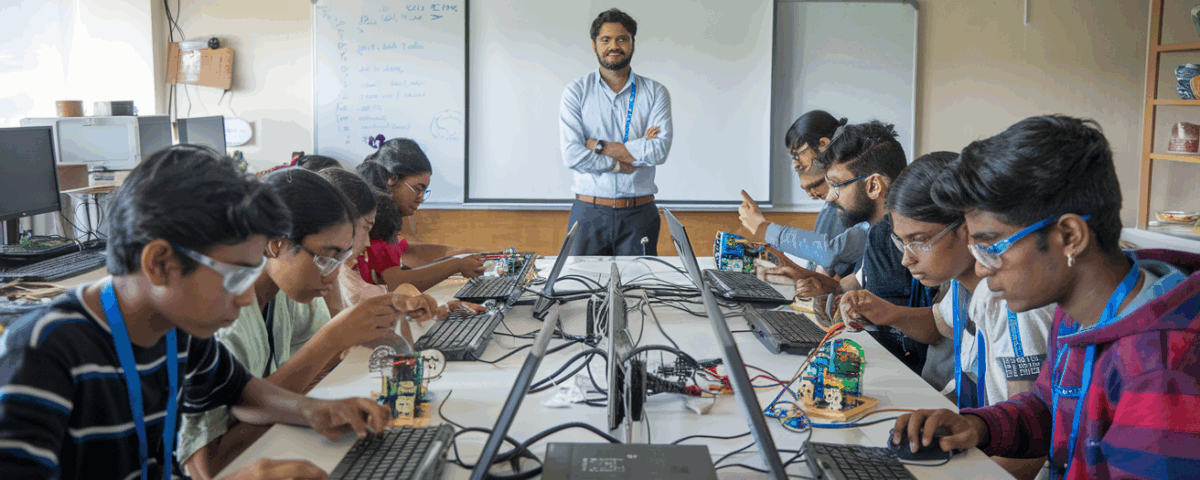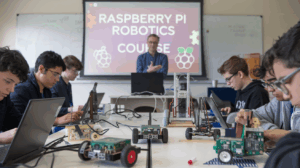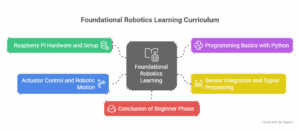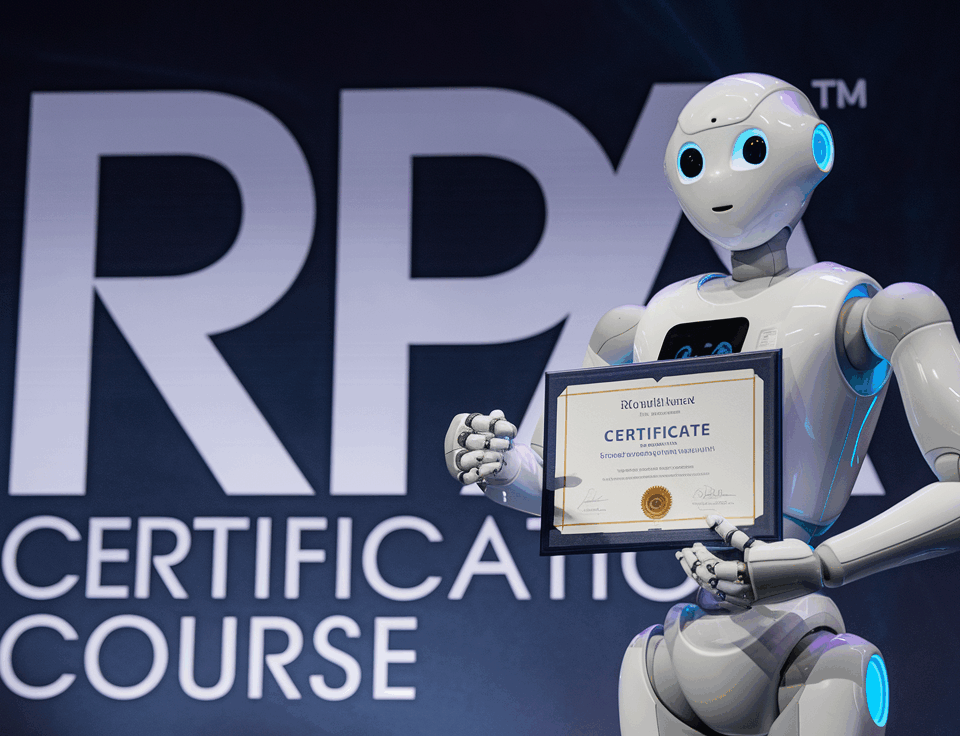
Best Robotics Class in India: Top Online Courses with Certificate for Beginners
July 15, 2025
Discover the Best Online Robotics Course – Elysium Embedded School
August 19, 2025As automation and intelligent devices continue to reshape industries and everyday life, robotics has emerged as a pivotal domain for innovation, education, and career growth. At the core of this technological shift is the Raspberry Pi — a small yet powerful and affordable microcomputer that offers extensive support for building smart, interactive robotic systems. Recognizing its significance, Elysium Embedded School offers a specialized Raspberry Pi Robotics Course tailored to equip learners with both foundational knowledge and applied skills in the field of embedded robotics.
The Raspberry Pi Robotics Course at Elysium Embedded School is designed to bridge the gap between academic concepts and practical engineering applications. It enables students to understand hardware-software integration, real-time system behavior, and sensor-actuator communication through structured training modules.
Whether you’re a beginner curious about robotics, an engineering student planning a final-year project, or a professional aiming to upskill, this Raspberry Pi Robotics Course provides a complete learning path. With its emphasis on real-world robotics scenarios, the course empowers learners to build autonomous systems, intelligent bots, and IoT-enabled robotic platforms using Raspberry Pi.
Ultimately, the Raspberry Pi Robotics Course at Elysium Embedded School opens doors to innovation and employability. It nurtures creativity and problem-solving skills while aligning with the growing demands of automation, IoT, and smart technology sectors.
Table of Contents
Beginner-Level Training: Raspberry Pi Robotics Course for Starters
Introduction to Foundational Robotics Learning
The Raspberry Pi Robotics Course for beginners provides essential grounding in the core concepts of electronics, embedded programming, and robotics. Designed for learners with minimal exposure, the curriculum simplifies entry into robotics through clear instruction and progressive technical tasks.
Understanding Raspberry Pi Hardware and Setup
The initial stage of the course introduces Raspberry Pi hardware and its architectural components. Learners are taught how to install and configure Raspbian OS, understand basic system setup, and perform updates to prepare the environment for development work.
Programming Basics with Python
The programming foundation is laid through Python, which is used for scripting control logic, working with variables, handling input/output, and writing interactive programs. This gives students the flexibility to write robotics code applicable to a variety of projects.
Sensor Integration and Signal Processing
Students explore how to connect the Raspberry Pi’s GPIO pins with external sensors and electronic components. They learn to collect data from sensors, apply digital signal processing, and trigger automated responses based on environmental input.
Actuator Control and Robotic Motion
The concept of actuator control is introduced using motors and servo motors. Learners implement motor drivers, develop control algorithms, and test mechanical movement to bring their robotic systems to life.
Conclusion of Beginner Phase
This phase of the Raspberry Pi Robotics Course ensures that students build a solid theoretical and technical base in embedded robotics. By the end of this module, beginners are equipped to progress to more advanced, project-driven robotics development.
Project-Oriented Learning: Final Year Raspberry Pi Robotics Module
Academic Relevance of the Raspberry Pi Robotics Course
For final year engineering students, delivering a comprehensive project is essential to academic success. The Raspberry Pi Robotics Course at Elysium Embedded School offers specialized project tracks that align with institutional guidelines and real-world industry demands. These projects give students the opportunity to apply embedded development principles in a structured, results-driven environment.
Autonomous Robots and Sensor-Based Navigation
Students enrolled in the Raspberry Pi Robotics Course design autonomous mobile robots that follow predefined paths or avoid obstacles. By integrating ultrasonic or infrared sensors, learners implement object detection and develop decision-making logic to enhance navigation and safety.
Voice-Controlled and Surveillance-Based Applications
In the voice-controlled robotics track, learners integrate speech recognition software with Raspberry Pi to enable voice-based robot movement. Similarly, students working on surveillance robots use Raspberry Pi camera modules to design and stream live video feeds. These systems often include remote monitoring features that replicate real-world security solutions.
IoT-Based Smart Automation Projects
The Raspberry Pi Robotics Course also allows students to experiment with home automation. These projects use mobile or web interfaces to control lighting, fans, or appliances. Raspberry Pi acts as the central controller, interpreting user commands and interacting with connected devices using Wi-Fi or Bluetooth.
Gesture Recognition and Environmental Monitoring Systems
Gesture-controlled robots are developed by integrating motion sensors or accelerometers. This teaches students the principles of intuitive human-machine interaction. Other students explore environmental robotics, where Raspberry Pi is used to gather and analyze temperature, humidity, or gas levels, contributing to smart agriculture or environmental safety solutions.
Project Development Workflow and Evaluation
Each project in the Raspberry Pi Robotics Course is executed through a detailed lifecycle: starting with hardware design, followed by embedded logic programming, then moving through system testing and performance analysis. Students are taught proper documentation techniques, version control practices, code commenting, and structured presentation skills to prepare for both academic review and industrial interviews.
Raspberry Pi Robotics Certification Course: Professional Qualification
Certification as Proof of Proficiency
The certification component of the Raspberry Pi Robotics Course evaluates participants’ ability to design and implement embedded robotic systems. It validates that learners are capable of building systems that integrate sensing, control, and communication using Raspberry Pi platforms.
Learning Embedded Linux and System Programming
Students are introduced to embedded Linux concepts and system-level programming practices. Through hands-on exercises, they develop skills in managing operating system functions, hardware drivers, and real-time performance tuning on the Raspberry Pi environment.
Sensor Communication and Peripheral Integration
Learners gain experience with serial communication protocols such as UART, I2C, and SPI. These interfaces are fundamental to connecting a wide range of sensors and peripherals, enabling students to build robots that respond to real-time environmental data.
Wireless Communication Techniques
The course also includes training in wireless communication, where students configure Wi-Fi and Bluetooth modules. These skills are essential for developing robots that can be remotely accessed, controlled, and monitored over local and cloud networks.
IoT Platform Integration and Mobile Control
To prepare for the future of robotics, students learn how to connect their Raspberry Pi projects to IoT platforms using protocols such as MQTT. Integration with services like Blynk allows real-time control and monitoring through smartphones or web interfaces.
Vision-Based Applications Using OpenCV
For students pursuing robotics with visual intelligence, the course introduces basic image processing techniques using OpenCV. This enables them to develop applications involving object tracking, facial recognition, or motion detection.
Certification and Evaluation
Upon completion, participants are evaluated through both project-based assessments and theoretical exams. Successful candidates receive a recognized certification from Elysium Embedded School, confirming their expertise in Raspberry Pi-based robotics development and increasing their credibility for academic and professional advancement.
Benefits of Raspberry Pi in Robotics Development
Raspberry Pi is increasingly used in educational and industrial robotics due to its affordability, flexibility, and processing capability. It runs on open-source Linux operating systems and supports programming languages such as Python, C++, and Java. This versatility allows developers to build custom robotic solutions that are both scalable and feature-rich.
The availability of GPIO pins makes it suitable for direct hardware interfacing with sensors and actuators. It can connect to the internet using built-in Wi-Fi and Ethernet ports, making remote control and monitoring straightforward. With multimedia support, Raspberry Pi also serves as a great platform for integrating cameras for vision-based robotics.
Its compatibility with multiple microprocessor architectures and integration with open-source tools makes it an accessible yet powerful tool for learners and professionals alike. Raspberry Pi’s role in robotics continues to grow due to its ability to support real-time operations, modular components, and a vibrant global community of developers.
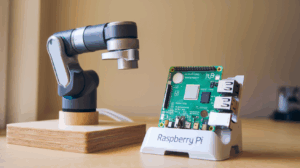
Rasperry Pi Course
Real-Time Training and Technical Implementation
The Raspberry Pi Robotics Course in Madurai includes rigorous technical training sessions where students build robotic systems from scratch. The training begins with basic circuit design using development kits and Raspberry Pi boards. Learners develop system schematics that outline connections between the Raspberry Pi, sensors, motor drivers, and power sources.
Students write and execute Python code to define robot behavior, starting with simple LED blinking and moving toward motion control. Modules on motor driver configuration introduce concepts like H-bridge circuits using ICs such as L293D and L298N. PWM control is taught to regulate motor speed and enable servo movement.
As students advance, they practice debugging techniques using the Linux command-line interface and diagnostic tools. Cloud-based control and mobile application integration add another layer of interactivity. These practical sessions strengthen understanding and foster innovation, ensuring learners can implement complex solutions independently.
Career Development and Placement Support through Raspberry Pi Robotics Course
Transitioning from Training to Industry Roles
After completing the Raspberry Pi Robotics Course with placement support at Elysium Embedded School, students receive structured career guidance designed to help them move confidently into core embedded and robotics job roles. The institution ensures every learner is equipped not only with technical knowledge but also with the professional tools required to succeed in the job market.
Resume Building and Technical Portfolio Guidance
Students are guided in creating impactful resumes that highlight their skills, certifications, and Raspberry Pi robotics projects. The course also helps them compile technical portfolios showcasing their embedded applications, sensor integration tasks, automation systems, and real-time problem-solving capabilities using Raspberry Pi.
Interview Preparation and Industry Readiness
To ensure interview readiness, the Raspberry Pi Robotics Course includes mock interviews and technical evaluations led by experienced trainers. These sessions replicate real-world hiring conditions and provide constructive feedback on technical communication, coding ability, and system design thinking.
Job Opportunities and Networking
Students are connected to hiring opportunities through campus recruitment drives, embedded system job fairs, and direct referrals to partner companies and robotics startups. Elysium Embedded School maintains a wide employer network to help place students in meaningful roles related to robotics, IoT, and automation.
Alumni Support and Long-Term Mentorship
Even after completing the course, students can remain part of the Elysium Embedded School alumni network. This allows continued access to job updates, skill enhancement workshops, and mentoring by past graduates working in the industry.
Career Outcomes for Graduates
Graduates of the Raspberry Pi Robotics Course have successfully taken up positions such as Embedded Robotics Developer, IoT Engineer, Automation Systems Programmer, and Technical Trainer across various regions in India and internationally. This outcome-focused approach ensures learners receive both technical preparation and the professional support necessary to thrive in embedded careers.
Applications of Raspberry Pi Robotics in Industry
The practical knowledge gained from the Raspberry Pi Robotics Course has broad applications across multiple domains. In education, learners use Raspberry Pi to create teaching aids and prototypes for STEM subjects. In industrial automation, robotic arms and monitoring bots improve production efficiency.
In healthcare, assistive robots support patient care and monitor vital signs. Agricultural robotics built on Raspberry Pi can measure soil moisture, temperature, and automate irrigation systems. For smart homes, robots provide solutions for security, cleaning, and appliance control. Research institutions also rely on Raspberry Pi for developing proof-of-concept models in robotics.
Tools, Technologies, and Development Platforms Covered
Participants in the Raspberry Pi Robotics Course gain exposure to several tools and development platforms. These include Raspberry Pi OS for embedded system operations, Python for logic building, and Linux CLI for terminal-based development.
They also work with OpenCV for vision systems, Blynk and MQTT for cloud-based IoT interfaces, and design applications like Fritzing or KiCad for schematic layout. Arduino IDE may also be used for hybrid robotic systems involving both Raspberry Pi and microcontroller integration.
Why Choose Elysium Embedded School for Raspberry Pi Robotics Course in Madurai
Center of Excellence in Embedded Systems Training
Based in Madurai, Elysium Embedded School has established itself as a hub for technical education, especially in embedded systems and robotics. The Raspberry Pi Robotics Course offered by the institution is carefully designed to align with industry standards, ensuring that students gain in-depth technical knowledge and the ability to apply it in real-world scenarios.
Industry-Focused Curriculum and Expert Faculty
The course stands out due to its structured curriculum that incorporates current job market expectations. Students enrolled in the Raspberry Pi Robotics Course benefit from learning under experienced faculty members with real-world industry exposure. Each module is designed to gradually build skills in embedded development, electronics, and automation through the use of Raspberry Pi technology.
Modern Infrastructure and Technical Resources
Elysium Embedded School provides students with access to modern laboratories equipped with Raspberry Pi boards, sensors, robotic components, and development tools. These resources help bridge the gap between classroom theory and hardware implementation, enabling students to design and deploy functional robotic systems.
Flexible Learning
The Raspberry Pi Robotics Course at Elysium Embedded School is available at an affordable cost, making it accessible to students from various educational backgrounds. The institute offers flexible batch timings and structured learning paths to accommodate both college students and working professionals.
Career Development and Long-Term Support
In addition to technical education, Elysium Embedded School provides students with continuous career support. This includes resume-building assistance, interview coaching, and access to recruitment drives. Alumni engagement and mentorship programs further enrich the student learning journey. As a result, the Raspberry Pi Robotics Course is not just a training program but a pathway to a stable and rewarding career in embedded systems and robotics.
FAQs
1. Who can join the Raspberry Pi Robotics Course at Elysium Embedded School?
Anyone with a background in electronics, computer science, or an interest in robotics can apply. The course is designed to accommodate beginners as well.
2. Does Elysium Embedded School provide project-based learning in this course?
Students actively participate in project-building sessions where they construct and test robots using Raspberry Pi and related components.
3. What certification is issued after completing the Raspberry Pi Robotics Course?
Elysium Embedded School awards a recognized certification upon course completion, certifying your knowledge in Raspberry Pi-based robotic development.
4. Does Elysium Embedded School offer placement assistance?
Yes. The program includes career development support such as resume building, interview preparation, and job referrals to companies in embedded and robotics sectors.
5. Can this course be used for academic final year projects?
Absolutely. Elysium Embedded School supports students in designing and submitting final-year projects by providing documentation, evaluation, and technical mentorship.
Conclusion
The Raspberry Pi Robotics Course at Elysium Embedded School offers a structured and technically comprehensive pathway for those aiming to specialize in robotics and embedded systems. Whether you are a beginner stepping into the field or a professional seeking skill enhancement, the course is designed to cover core concepts, practical implementation, and project development aligned with industry expectations.
By enrolling in the Raspberry Pi Robotics Course, students gain exposure to system design, sensor integration, automation logic, and real-time application building—all using a platform that is widely adopted in both academic and industrial domains.
One of the key strengths of the Raspberry Pi Robotics Course is its emphasis on practical project execution and professional certification. This ensures that learners not only understand theoretical concepts but also apply them effectively to meet academic and professional standards.
Additionally, the Raspberry Pi Robotics Course includes strong placement support, connecting students with career opportunities in embedded systems, IoT, and automation sectors. Personalized mentoring, resume preparation, and direct referrals are part of the post-course benefits.
Elysium Embedded School continues to be a trusted center of excellence for embedded training in Tamil Nadu. For students in Madurai and across the region, the Raspberry Pi Robotics Course serves as a reliable and result-driven program to build a career in intelligent robotics and embedded development.

